Decline to Bid Letter Templates for Professional Responses
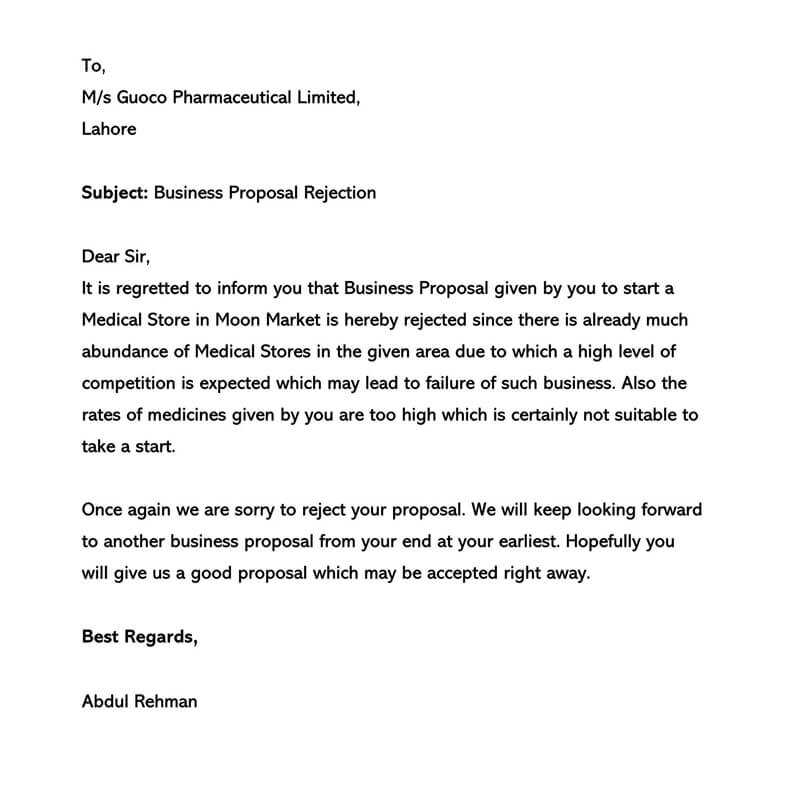
In the business world, responding thoughtfully to offers you choose not to pursue is an essential skill. Whether due to budget constraints, time limitations, or misalignment with your goals, crafting a professional refusal can help maintain strong relationships with potential partners. These responses, when done correctly, reflect respect and leave the door open for future opportunities.
Writing a considerate refusal involves more than simply stating a rejection. It requires clarity and politeness while ensuring that the message is clear yet diplomatic. Understanding the right tone and structure is crucial to ensure that the communication is professional and leaves a positive impression.
Mastering this communication technique helps convey professionalism, preserving valuable connections in your industry. Knowing how to address these situations with courtesy can turn an initially disappointing response into a foundation for long-term cooperation.
Effective Templates for Declining Bids
Creating a well-structured response to offers that won’t be pursued is essential in maintaining professionalism. A carefully crafted refusal can express appreciation while keeping the communication respectful and clear. Different scenarios require different approaches, and understanding the key components helps ensure the message is both polite and direct.
The most effective responses focus on being concise, honest, and respectful. By using the appropriate tone, businesses can avoid misunderstandings and maintain a positive image. Below is a table showcasing several key elements to include in these responses to ensure clarity and professionalism.
| Element | Description |
|---|---|
| Polite Introduction | Start by thanking the recipient for their effort and time spent on the offer. |
| Clear Reason | Provide a brief, clear explanation of why the offer will not be pursued without going into too much detail. |
| Future Opportunities | Express willingness to consider future collaborations or opportunities, maintaining a positive relationship. |
| Professional Closing | End with a courteous closing, reaffirming respect for the recipient’s work and wishing them success. |
Why You Need a Decline to Bid Letter
When choosing not to move forward with a proposal, it’s essential to communicate your decision clearly and professionally. A formal response is a crucial step in maintaining transparency and professionalism, ensuring that both parties are on the same page. By providing a well-crafted message, you show respect for the other party’s time and effort while preserving a positive relationship.
Such communications help avoid misunderstandings and prevent any negative feelings from lingering. In the business world, it is important to handle refusals with care, as future opportunities may arise from the same individuals or companies. A well-articulated refusal can also reflect positively on your organization, showcasing your attention to detail and respect for others’ work.
Key Elements to Include in Your Letter
When crafting a response to an offer you wish to decline, it’s important to focus on clarity and professionalism. Including the right elements ensures your message is respectful and transparent, while also leaving room for potential future collaboration. Below are the key aspects to consider when composing such a response.
Clear Explanation
Providing a concise explanation of why the offer is being rejected is essential. This doesn’t need to be detailed, but it should offer enough context to avoid any confusion. Whether it’s due to timing, budget constraints, or other priorities, being transparent will help the recipient understand your decision.
Positive Tone
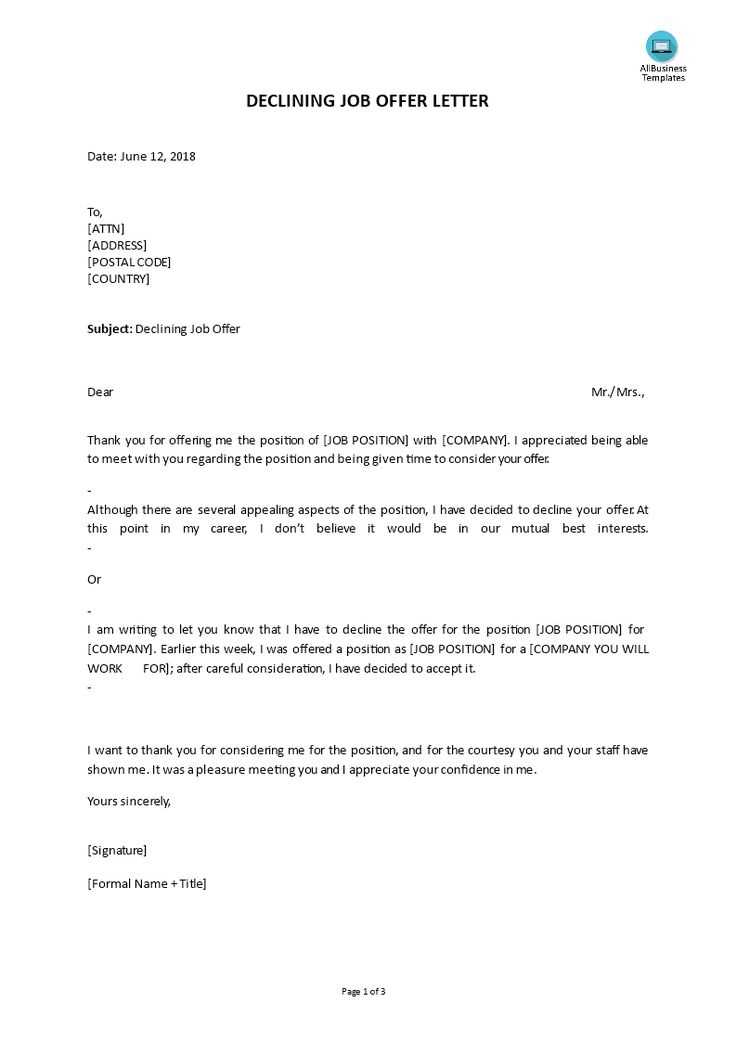
Even when delivering a refusal, it’s important to maintain a positive tone. Acknowledge the effort and time the other party put into the proposal. By expressing appreciation for their work, you demonstrate professionalism and respect.
Encouraging future communication is also valuable. Mentioning the possibility of future opportunities fosters goodwill and keeps the door open for potential collaborations down the road.
Common Mistakes in Bid Rejections
When turning down an offer, it’s important to handle the situation with care to avoid making mistakes that could damage relationships or harm your professional reputation. A poorly written response or lack of clarity can leave the wrong impression, creating unnecessary tension. Below are some common errors to watch out for when rejecting proposals.
One common mistake is being too vague. Simply stating “we won’t be moving forward” without offering any context can confuse the recipient and lead to frustration. A brief but clear explanation of the decision is crucial to maintaining transparency.
Another mistake is failing to acknowledge the effort put into the proposal. Ignoring the time and work invested can come across as disrespectful. It’s important to thank the sender for their submission and recognize their contributions, even if the decision is to move in a different direction.
Additionally, leaving out the possibility of future collaboration can close doors unnecessarily. A refusal should never be final unless there is a clear reason. By expressing a willingness to stay in touch, you maintain a professional relationship and keep options open for future opportunities.
How to Maintain Positive Relationships
Handling refusals tactfully is key to preserving valuable professional connections. While turning down an offer is sometimes necessary, the way you communicate this decision can either strengthen or harm future interactions. Maintaining a positive relationship after a rejection ensures that potential opportunities remain open and that both parties feel respected.
Be Transparent and Respectful
Being clear and respectful in your response sets a positive tone. Here are some tips to ensure your message is received well:
- Provide a brief but honest reason for the decision, without being overly detailed or critical.
- Express appreciation for the time and effort the other party invested in their proposal.
- Maintain a polite and professional tone throughout the communication.
Encourage Future Collaboration
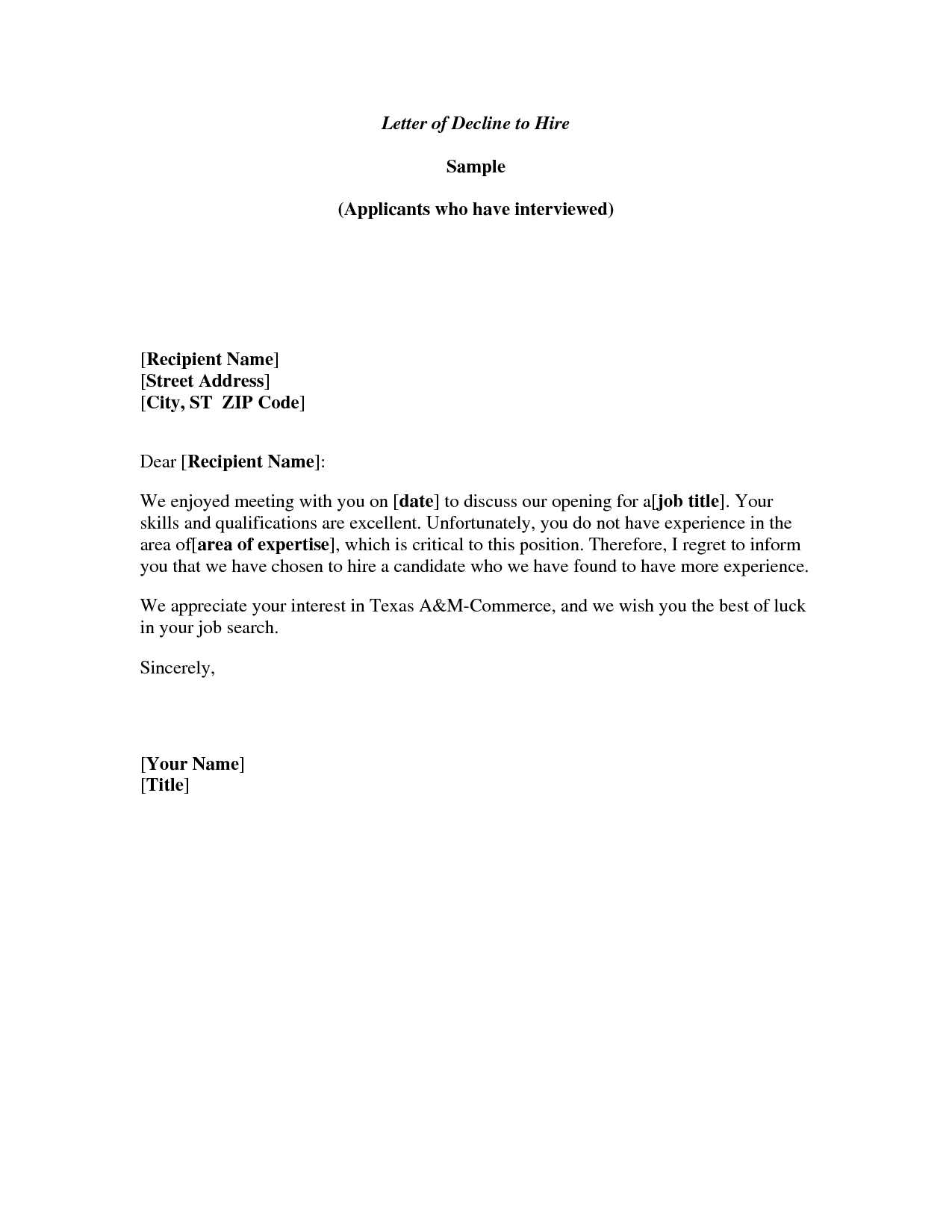
Even if the current offer isn’t suitable, it’s important to suggest the possibility of working together in the future. Here are a few ways to keep the door open:
- Express your interest in staying in touch for future opportunities.
- Invite them to reach out if other proposals arise that may align better with your needs.
- Show your openness to maintaining an ongoing professional relationship.
By following these practices, you ensure that even a refusal is a chance to build goodwill and leave the door open for future collaborations.
Customizing Decline Letters for Specific Cases
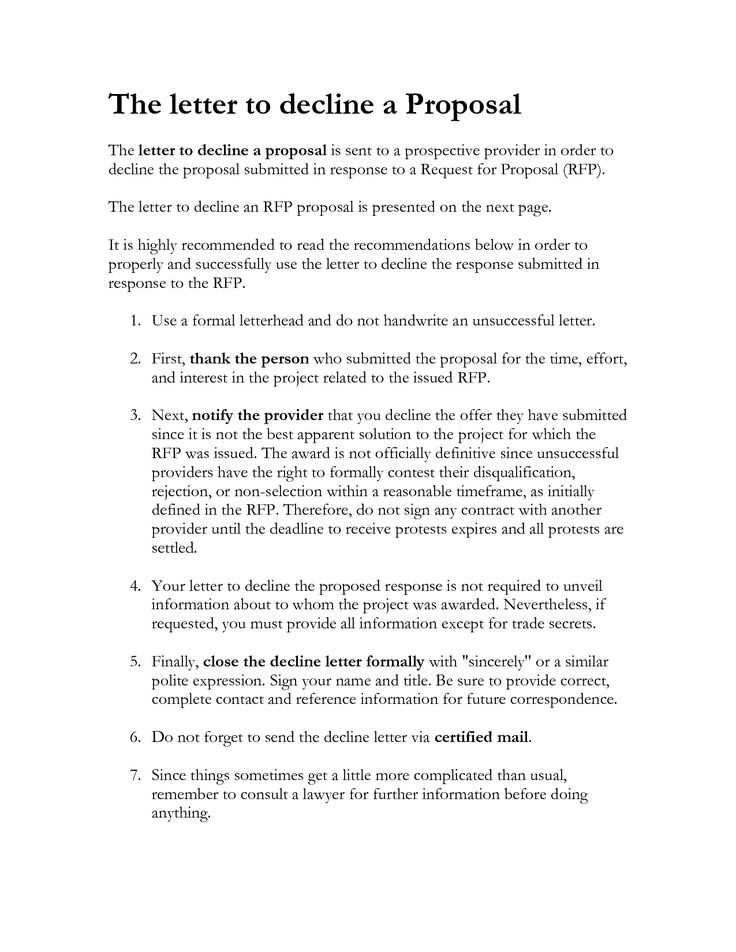
Tailoring your responses to specific situations is crucial for maintaining a professional and respectful tone. Each offer you choose not to pursue may have different circumstances surrounding it, and addressing these details can show that you’ve carefully considered the proposal. Customization ensures that your message resonates well and leaves the right impression for future opportunities.
Consider the Nature of the Proposal
When responding to different types of offers, adjusting the tone and content based on the nature of the proposal is key. Here are some ways to personalize your response:
- If the proposal is highly detailed, acknowledge the effort and thoroughness put into it.
- If the proposal comes from a long-standing partner or business associate, emphasize your appreciation for the ongoing relationship.
- For a new or unfamiliar proposal, briefly explain why it doesn’t align with your current needs or priorities.
Maintain Professionalism and Positivity
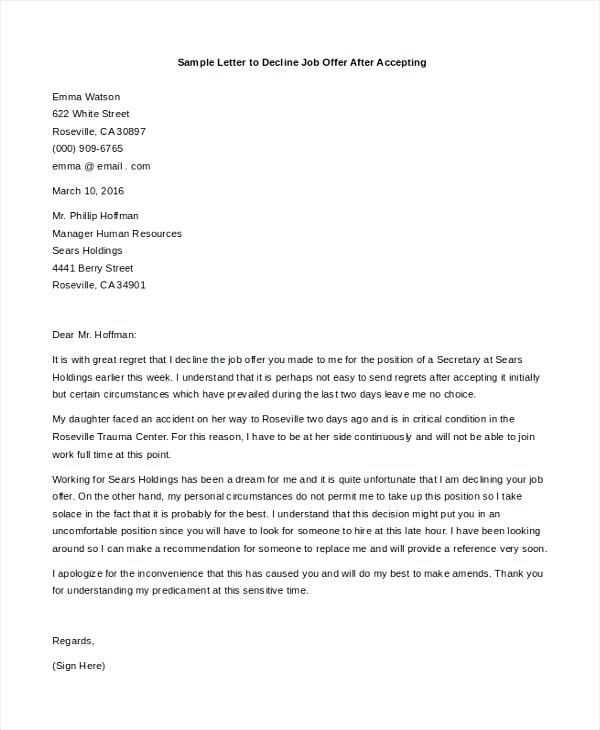
In all cases, ensure that your refusal remains courteous and leaves room for future interactions. Here are a few things to consider when tailoring your communication:
- Always express gratitude for the effort and time spent on the proposal.
- Offer a concise explanation that addresses the specific reasons without being overly critical.
- Reaffirm the value of maintaining a professional connection for future opportunities.
By customizing your responses based on the context, you create more meaningful interactions and maintain positive relationships with all parties involved.
Professional Tone in Rejection Letters
Maintaining a professional tone when communicating a refusal is essential for preserving relationships and ensuring that the process remains respectful and clear. A well-crafted response that conveys your decision politely can prevent misunderstandings and help maintain a positive image for your organization. It’s important to strike the right balance between being firm in your decision and considerate of the other party’s efforts.
A polite and neutral tone helps to soften the impact of the rejection while ensuring that your message is still clear. Avoid using language that could be perceived as harsh or dismissive. Instead, focus on showing appreciation for the effort and time invested in the proposal, even if you are unable to move forward with it.
In addition, a professional tone reflects well on your company and shows that you value the relationship, even if the current offer doesn’t meet your needs. Offering brief feedback, when appropriate, can also demonstrate thoughtfulness and enhance the professionalism of your response.